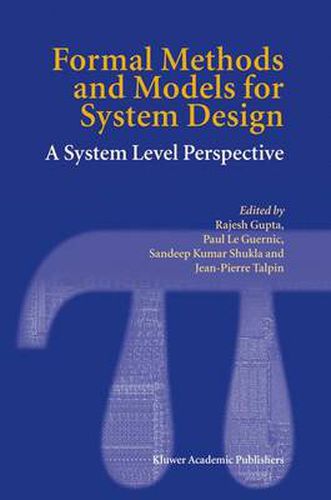Readings Newsletter
Become a Readings Member to make your shopping experience even easier.
Sign in or sign up for free!
You’re not far away from qualifying for FREE standard shipping within Australia
You’ve qualified for FREE standard shipping within Australia
The cart is loading…






The gap between the size of microelectronic design/validation task and our ability to design these in a reasonable time is steadly increasing. We need tools and techniques to bridge this gap. Formal models and methods hold this promise by their focus on scalability, efficiency and design optimization. In additional, we need methodological innovations to bring formal techniques into practice. Exploiting the structure of the systems to decompose the problems into smaller ones, discovering the hierarchy and proper decomposition, abstraction, refinement, and other behavioral and structural properties of system are important for successful use of formal methods Formal Methods and Models for System Design is organized as a series of articles written by industrial and academic experts who apply formal methods in hardware and software design, develop methodologies and tools, or develop theoretical formalisms. The emphasis of the book is on (i) formal frameworks for complex system modeling, such as system-on-chip, embedded software, component based systems, (ii) formal verification techniques, especially abstraction and refinement based methodologies, (iii) behavioral type theory for system integration, (iv) optimization techniques for executable system level models for efficient simulation, and execution, and (v)formal models for post-production configurability. Formal Methods and Models for System Design will provide readers with a sample of some of the recent developments in formal methods in system design. It can also be used as a graduate level text for a seminar based course.
$9.00 standard shipping within Australia
FREE standard shipping within Australia for orders over $100.00
Express & International shipping calculated at checkout
The gap between the size of microelectronic design/validation task and our ability to design these in a reasonable time is steadly increasing. We need tools and techniques to bridge this gap. Formal models and methods hold this promise by their focus on scalability, efficiency and design optimization. In additional, we need methodological innovations to bring formal techniques into practice. Exploiting the structure of the systems to decompose the problems into smaller ones, discovering the hierarchy and proper decomposition, abstraction, refinement, and other behavioral and structural properties of system are important for successful use of formal methods Formal Methods and Models for System Design is organized as a series of articles written by industrial and academic experts who apply formal methods in hardware and software design, develop methodologies and tools, or develop theoretical formalisms. The emphasis of the book is on (i) formal frameworks for complex system modeling, such as system-on-chip, embedded software, component based systems, (ii) formal verification techniques, especially abstraction and refinement based methodologies, (iii) behavioral type theory for system integration, (iv) optimization techniques for executable system level models for efficient simulation, and execution, and (v)formal models for post-production configurability. Formal Methods and Models for System Design will provide readers with a sample of some of the recent developments in formal methods in system design. It can also be used as a graduate level text for a seminar based course.